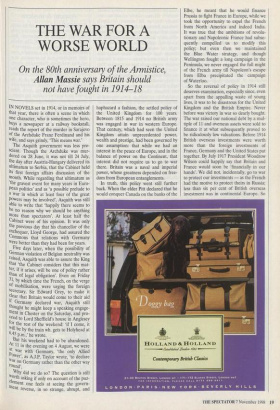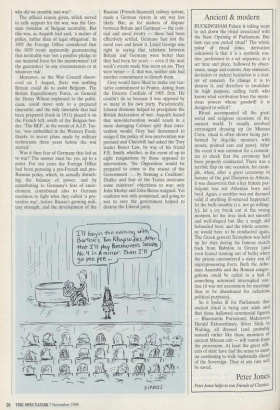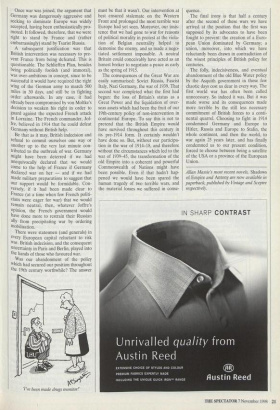THE WAR FOR A WORSE WORLD
On the 80th anniversary of the Armistice,
Allan Massie says Britain should
not have fought in 1914-18
IN NOVELS set in 1914, or in memoirs of that year, there is often a scene in which one character, who is sometimes the hero, buys a newspaper at a railway bookstall, reads the report of the murder in Sarajevo of the Archduke Franz Ferdinand and his Wife, and says grimly, 'This means war.' The Asquith government was less pre- scient. Though the Archduke was mur- dered on 28 June, it was not till 24 July, the day after Austria-Hungary delivered its Ultimatum to Serbia, that the Cabinet held its first foreign affairs discussion of the Month. While regarding that ultimatum as the gravest event for many years in Euro- pean politics' and as 'a possible prelude to a war in which at least four of the great Powers may be involved', Asquith was still able to write that 'happily there seems to be no reason why we should be anything more than spectators'. At least half the Cabinet were of his opinion. It was only the previous day that his chancellor of the exchequer, Lloyd George, had assured the Commons that relations with Germany were better than they had been for years. Five days later, when the possibility of German violation of Belgian neutrality was raised, Asquith was able to assure the King that 'the Cabinet considers that this mat- ter, if it arises, will be one of policy rather than of legal obligation'. Even on Friday 31, by which time the French, on the verge of mobilisation, were urging the foreign secretary, Sir Edward Grey, to make it clear that Britain would come to their aid If Germany declared war, Asquith still thought he might keep a speaking engage- ment in Chester on the Saturday, and pro- ceed to Lord Sheffield's house in Anglesey for the rest of the weekend: 'if I come, it will be by the train wh. gets to Holyhead at 6.45 P.m.,' he wrote. But his weekend had to be abandoned. At 11 in the evening on 4 August, we were at war with Germany, 'the only Allied Power', as A.J.P. Taylor wrote, 'to declare war on Germany rather than the other way round'.
Why did we do so? The question is still Worth asking if only on account of the puz- zlement one feels at seeing the govern- ment reverse, in so strange, abrupt, and haphazard a fashion, the settled policy of the United Kingdom for 100 years. Between 1815 and 1914 no British army was engaged in war in western Europe. That century, which had seen the United Kingdom attain unprecedented power, wealth and prestige, had been governed by one assumption: that while we had an interest in the peace of Europe, and in the balance of power on the Continent, that interest did not require us to go to war there. Britain was a naval and imperial power, whose greatness depended on free- dom from European entanglements.
In truth, this policy went still further back. When the elder Pitt declared that he would conquer Canada on the banks of the Elbe, he meant that he would finance Prussia to fight France in Europe, while we took the opportunity to expel the French from North America and indeed India. It was true that the ambitions of revolu- tionary and Napoleonic France had subse- quently compelled us to modify this policy; but even then we maintained the Blue Water strategy, and though Wellington fought a long campaign in the Peninsula, we never engaged the full might of the French army till Napoleon's escape from Elba precipitated the campaign of Waterloo.
So the reversal of policy in 1914 still deserves examination, especially since, even apart from the appalling waste of young lives, it was to be disastrous for the United Kingdom and the British Empire. Never before was victory in war so dearly bought. The war raised our national debt by a mul- tiple of 11 and overseas assets were sold to finance it at what subsequently proved to be ridiculously low valuations. Before 1914 British overseas investments were worth more than the foreign investments of France, Germany and the United States put together. By July 1917 President Woodrow Wilson could happily say that Britain and France would soon be 'financially in our hands'. We did not, incidentally, go to war to protect our investments — as the French had the motive to protect theirs in Russia; less than six per cent of British overseas investment was in continental Europe. So why did we stumble into war?
The official reason given, which served to rally support for the war, was the Ger- man violation of Belgian neutrality. But this was, as Asquith had said, 'a matter of policy, rather than of legal obligation'. In 1905 the Foreign Office considered that the 1839 treaty apparently guaranteeing that neutrality was 'not a positive pledge to use material force for the maintenance' (of the guarantee) 'in any circumstances or at whatever risk'.
Moreover, as the War Council discov- ered on 5 August, there was nothing Britain could do to assist Belgium. The British Expeditionary Force, as General Sir Henry Wilson explained to the politi- cians, could move only to a prepared timetable; and the only timetable that had been prepared (back in 1911) placed it on the French left, south of the Belgian bor- der. 'The BEF', in the words of A.J.P. Tay- lor, 'was embedded in the Western Front, thanks to secret plans made by military technicians three years before the war started.'
Was it then fear of Germany that led us to war? The answer must be: yes, up to a point. For ten years the Foreign Office had been pursuing a pro-French and pro- Russian policy, which, by actually disturb- ing the balance of power, and by contributing to Germany's fear of encir- clement, contributed also to German readiness to fight what they called 'a pre- ventive war', before Russia's growing mili- tary strength, and the development of the Russian (French-financed) railway system, made a German victory in any war less likely. But, as for matters of dispute between Britain and Germany — the colo- nial and naval rivalry — these had been effectively settled. Germany had lost the naval race and knew it. Lloyd George was right in saying that relations between Britain and Germany were better than they had been for years — even if the next week's events made him seem an ass. They were better — if, that was, neither side had another commitment to disturb them.
Grey would have liked to make our ten- tative commitment to France, dating from the Entente Cordiale of 1905, firm. He couldn't do so because it was opposed by so many in his own party. Paradoxically, Liberal divisions helped to precipitate the British declaration of war. Asquith feared that non-intervention would result in a more damaging Cabinet split than inter- vention would. Grey had threatened to resign if the policy of non-intervention was pursued and Churchill had asked the Tory leader Bonar Law, by way of his friend F.E. Smith, whether, in the event of up to eight resignations by those opposed to intervention, 'the Opposition would be prepared to come to the rescue of the Government . . . by forming a Coalition'. Dislike and fear of the Tories overcame some ministers' objections to war; only John Morley and John Burns resigned. Yet coalition was only postponed, and going to war to save the government helped to destroy the Liberal party. Once war was joined, the argument that Germany was dangerously aggressive and seeking to dominate Europe was widely accepted, having been enthusiastically pro- moted. It followed, therefore, that we were right to stand by France and (rather embarrassingly) stand by Tsarist Russia.
A subsequent justification was that British intervention was necessary to pre- vent France from being defeated. This is questionable. The Schlieffen Plan, besides being politically foolish (and immoral), was over-ambitious in concept, since to be successful it would have required the right wing of the German army to march 500 miles in 30 days, and still be in fighting order afterwards. In any case, it had already been compromised by von Moltke's decision to weaken his right in order to guard against the expected French attack In Lorraine. The French commander, Jof- fre, believed in 1914 that he could defeat Germany without British help.
Be that as it may, British indecision and refusal to commit ourselves one way or another up to the very last minute con- tributed to the outbreak of war. Germany might have been deterred if we had unequivocally declared that we would come to the help of France if Germany declared war on her — and if we had made military preparations to suggest that our support would be formidable. Con- versely, if it had been made clear to France (at a time when few French politi- cians were eager for war) that we would remain neutral, then, whatever Joffre's Opinion, the French government would have done more to restrain their Russian ally from precipitating war by ordering mobilisation.
There were statesmen (and generals) in every European capital reluctant to risk war. British indecision, and the consequent uncertainty in Paris and Berlin, played into the hands of those who favoured war.
Was our abandonment of the policy Which had secured our position throughout the 19th century worthwhile? The answer 'I've been made drugs monitor!' must be that it wasn't. Our intervention at best ensured stalemate on the Western Front and prolonged the most terrible war Europe had yet seen. Moreover, our insis- tence that we had gone to war for reasons of political morality in protest at the viola- tion of Belgian neutrality helped to demonise the enemy, and so made a nego- tiated settlement impossible. A neutral Britain could conceivably have acted as an honest broker to negotiate a peace as early as the spring of 1915.
The consequences of the Great War are easily summarised: Soviet Russia, Fascist Italy, Nazi Germany, the war of 1939. That second war completed what the first had begun: the loss of Britain's status as a Great Power and the liquidation of over- seas assets which had been the fruit of our 19th-century policy of non-intervention in continental Europe. To say this is not to pretend that the British Empire would have survived throughout this century in its pre-1914 form. It certainly wouldn't have done so. But, without our participa- tion in the war of 1914-18, and therefore without the circumstances which led to the war of 1939-45, the transformation of the old Empire into a coherent and powerful Commonwealth of Nations might have been possible. Even if that hadn't hap- pened we would have been spared the human tragedy of two terrible wars, and the material losses we suffered in conse- quence.
The final irony is that half a century after the second of these wars we have arrived at the position that the first was supposed by its advocates to have been fought to prevent: the creation of a Euro- pean Union dominated by Germany; a union, moreover, into which we have reluctantly been drawn in contradiction of the wisest principles of British policy for centuries.
The folly, indecisiveness, and eventual abandonment of the old Blue Water policy by the Asquith government in those few chaotic days cost us dear in every way. The first world war has often been called unnecessary. So indeed it was. But it was made worse and its consequences made more terrible by the still less necessary commitment of British forces to a conti- nental quarrel. Choosing to fight in 1914 condemned Germany and Europe to Hitler, Russia and Europe to Stalin, the whole continent, and then the world, to war again 25 years later, and has finally condemned us to our present condition, forced to choose between being a satellite of the USA or a province of the European Union.
Allan Massie's most recent novels, Shadows of Empire and Antony are now available in paperback, published by Vintage and Sceptre respectively.




















































































 Previous page
Previous page